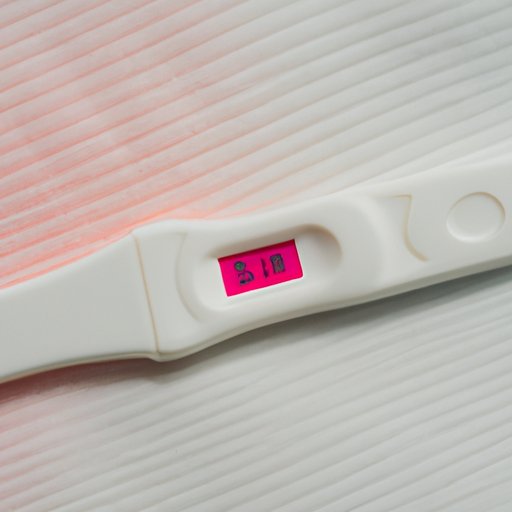
I. Introduction
Many women who are trying to conceive or suspect they may be pregnant wonder, “How early can I take a pregnancy test?” This can be a confusing and anxious time, especially if you are hoping for a positive result. In this article, we will provide a comprehensive guide to taking a pregnancy test early. We will cover the mechanics of how pregnancy tests work and explain the pros and cons of taking a test as soon as possible. We will also discuss common myths and misconceptions and offer advice on coping with the emotional impact of uncertain results.
II. Understanding how early pregnancy tests work
Pregnancy tests work by detecting the presence of a hormone called human chorionic gonadotropin (hCG), which is produced by the placenta after fertilization. hCG levels rise rapidly in the early weeks of pregnancy, which is why tests can detect pregnancy as early as one week after a missed period. Most tests are designed to be used with a urine sample, although some tests can also use blood.
Some tests are more sensitive than others and can detect lower levels of hCG. Tests marketed as “early detection” tests are especially sensitive and can detect hCG before a missed period. These tests can be accurate as early as 10 days after ovulation.
Keep in mind that the accuracy of a pregnancy test depends on many factors, such as the timing of ovulation and the sensitivity of the test. To get the most accurate results, it is important to follow the instructions carefully and wait until the appropriate time to take the test.
III. Pros and cons of taking a pregnancy test as soon as possible
Taking a pregnancy test as soon as possible has both advantages and disadvantages. For many women, the relief of knowing whether they are pregnant or not outweighs the risks of false negatives or emotional distress.
Advantages of taking a test early include:
- Relief of anxiety: If you are trying to conceive, the waiting and uncertainty can be stressful. Taking a test early can provide peace of mind and help you plan for the future.
- Early access to prenatal care: If you do get a positive result, you can start taking steps to ensure a healthy pregnancy, such as scheduling a prenatal check-up and taking prenatal vitamins.
Disadvantages of taking a test early include:
- Higher risk of false negative: If you take a test too soon, you may not have enough hCG in your system to trigger a positive result, even if you are pregnant. This is known as a false negative and can be both confusing and disappointing.
- Emotional toll of uncertain results: If you get a negative result early on, you may feel discouraged or uncertain. This can be especially difficult if you are trying to conceive and have been hoping for a positive result.
When deciding whether to take a test early, it is important to consider your individual circumstances and emotional readiness.
IV. Common misconceptions about the earliest possible time to take a pregnancy test
There are many misconceptions about the earliest possible time to take a pregnancy test. Some women believe they can take a test immediately after ovulation or even before a missed period. However, these myths are not only incorrect but can also lead to unnecessary anxiety and confusion.
The truth is that the earliest you can take a pregnancy test and get accurate results depends on many factors, such as the sensitivity of the test and the timing of ovulation. While some women may get positive results as early as 10 days after ovulation, most tests are not accurate until after a missed period.
V. Determining ovulation and the best time to take a pregnancy test
To determine the best time to take a pregnancy test, it is important to understand how ovulation works. Ovulation occurs when an egg is released from the ovary and travels down the fallopian tube, where it may be fertilized by sperm. For most women, ovulation occurs around 14 days before the start of their next period.
There are several methods to track ovulation, including monitoring basal body temperature, tracking cervical mucus, and using ovulation predictor kits. These methods can help you pinpoint the most likely time of ovulation and give you a better idea of when to take a pregnancy test.
The best time to take a pregnancy test is generally after a missed period or at least one week after ovulation. Waiting until this time can ensure the most accurate results and reduce the risk of false negatives.
VI. The accuracy of early pregnancy tests and how to choose the right one
Early pregnancy tests can be highly accurate, but there are many factors that can affect their reliability. Some tests may be more sensitive than others and can detect lower levels of hCG. However, even the most sensitive tests can produce false negatives if taken too early or if the user does not follow the instructions carefully.
There are several types of pregnancy tests on the market, including traditional urine tests and digital tests. Digital tests may be more expensive but can provide clearer results and may be less prone to user error.
When choosing a pregnancy test, it is important to consider your individual needs and circumstances. Look for tests that are easy to use and offer clear, accurate results. If you have any concerns or questions, talk to your healthcare provider.

VII. Coping with the emotional impact of taking a pregnancy test too soon
Taking a pregnancy test too soon can be emotionally challenging, especially if the results are uncertain or negative. Some women may feel anxious, disappointed, or even depressed. However, there are several strategies that can help you cope with these feelings and manage the waiting period.
Some tips for managing anxiety and waiting for accurate results include:
- Practice self-care: Take time to do things you enjoy and engage in activities that help you relax, such as yoga or reading.
- Reach out for support: Talk to a partner, friend, or healthcare provider about your feelings and concerns. They can provide comfort and guidance during this stressful time.
- Stay busy: Keep yourself occupied with work, hobbies, or other activities. This can help you take your mind off the waiting and reduce anxiety.
VIII. Conclusion
Taking a pregnancy test early can be stressful and confusing, but with the right information and support, you can make an informed decision about when to test. Remember that the accuracy of a test depends on many factors, so it is important to follow the instructions carefully and wait until the appropriate time to take the test. If you are struggling with the emotional impact of uncertain results, reach out for support from a partner, friend, or healthcare provider. With patience and perseverance, you can navigate the ups and downs of trying to conceive and find the answers you are looking for.





